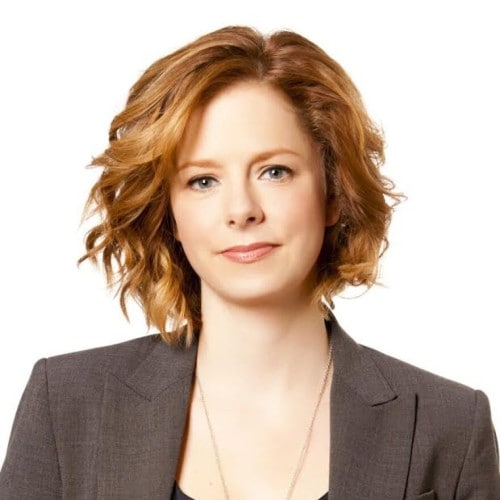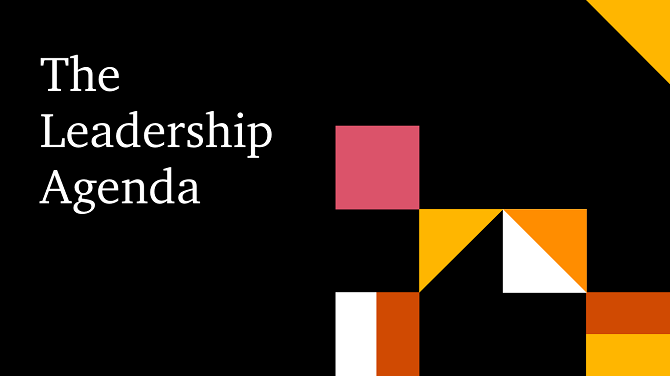{{item.title}}
{{item.text}}

{{item.text}}
Take on Tomorrow, the award-winning podcast from our management publication strategy+business, brings you Episode 6: “What’s the point of stakeholder capitalism?”
Stakeholder capitalism is the idea that businesses have a responsibility that extends beyond their shareholders. Employees, the media, and investors are urging businesses to take a stand on issues that affect their wider communities and create greater equality. We discuss how businesses must now resolve the challenge of generating shareholder value while tackling issues like diversity and inclusion and climate change. In this episode, we’ll also hear about the urgent steps that businesses need to take to deliver to all their stakeholders.
Lizzie O’Leary
Podcaster and journalist
Ayesha Hazarika
Columnist and former senior political advisor
Alison Taylor
Director of Ethical Systems, NYU’s Stern School of Business
Richard Oldfield
Former Global Markets Leader, PwC
2023 Shorty award winner for "Best Branded Podcast" series
2023 Webby award nominee for "Best Podcast" series
{{item.text}}

{{item.text}}
As reinvention pressure rises, CEOs need to rewire their decision-making.
Sharp, actionable insights curated to help global leaders build trust and deliver sustained outcomes. Explore our latest content on the global issues affecting organisations today from ESG to value creation, technology and cyber to workforce transformation.
Alison Taylor: So that PR-led strategy, where it’s just talk and there’s no action. Really, you’re getting all the downsides of the culture war and none of the upsides of actually making your business better.
Richard Oldfield: In a world where trust is lacking, particularly in government, employees are expecting business leaders to actually fill that trust gap, and they expect them to stand up for the ethical and important decisions that they believe need to be dealt with.
Alison: The challenge for a CEO today is that you still need to create shareholder value. But now, you’ve got all these other pressures and all these other voices saying that you shouldn’t be prioritizing shareholder value at all costs. So, to me, that is really the challenge for today’s corporate leaders—and what’s keeping them up at night.
Ayesha Hazarika: From PwC’s management publication strategy and business, this is Take on Tomorrow, the podcast that brings together experts from around the globe to figure out what business could and should be doing to tackle some of the biggest issues facing the world.
I’m Ayesha Hazarika, a broadcaster and former senior political advisor in London.
Lizzie O’Leary: And I’m Lizzie O’Leary, a journalist in New York. Today, we’re taking on a big topic: the nature of capitalism.
Ayesha: We are living in increasingly difficult times—from political polarizations and war to soaring living costs, climate change, and the global pandemic. These things all affect businesses profoundly and can only be tackled if corporations and business leaders play their part.
Today, we’re talking about what motivates businesses to help tackle these issues and what needs to change to the structure of our market economy to accelerate action. What kind of structure should our corporations adopt to help solve some of these problems? On the show today, to help us figure out the answers to some of these questions, is Alison Taylor, one of the people we heard from at the start. Alison’s the executive director of Ethical Systems at NYU’s Stern School of Business in New York.
But first today, I’m talking to PwC’s global markets leader, Richard Oldfield.
Richard, hello, and welcome to the show.
Richard: Hello, Ayesha, and thanks so much for having me along today.
Ayesha: Well, it’s a real pleasure to have you on, Richard. Now, for those of us who don’t know, what does your title, global markets leader, mean? Tell us what your day looks like?
Richard: Many people don’t know what my job title means, Ayesha. So, I’m responsible for the service that we give to our clients all the way around the world, making sure that we’ve got the infrastructure in place so that we can deliver on our promise to clients and our strategy of building trust and helping people deliver sustained outcomes.
Lizzie: We’re going to be focusing a lot on valuing stakeholders in our conversation today, Richard. I mean, is this something new? Is it something you’ve certainly dealt with in the past, or is this a new current?
Richard: Well, let’s put this into some historical context. Through most of the 19th century, stakeholder capitalism was the normal. Actually, that changed at the turn of the 20th century. But again, we switched back to stakeholder capitalism after the Great Depression, when there was a big need for business, for governments to work together, to solve the problems that were in society at the time. And that continued right the way through to the 1970s. So, we really had maximizing value for shareholders as a mantra until the last few years. And I think we’re now in that same period where there are some huge challenges where business, governments, and other stakeholders have to work together to really deal with them.
Lizzie: Richard, thank you for that—really interesting observations. And we’re going to come back to you in a moment. But let’s get into what this emerging notion of stakeholder capitalism actually is. And, Ayesha, you spoke to Alison Taylor to help shed some light on that question. Alison has spent the last two decades consulting multinational companies on everything from anti-corruption and human rights to social impact and ESG. Alongside her role as executive director of Ethical Systems, she’s an adjunct professor at NYU’s Stern School of Business. So, if there’s anyone who knows why stakeholder capitalism is in the spotlight, it’s her. Let’s dive right into it.
Ayesha: Alison, welcome, you are a real expert on the concept of responsible capitalism, stakeholder capitalism. Just describe to us in really basic terms, what does that mean?
Alison: It’s a great question! And you hear the word stakeholder being bandied around a lot these days.
Let’s start off by saying it’s not my favorite word in the world, because I don’t think it’s super clear what it means. But the way it is taken to mean by people, that use it, is anyone with a stake in a business. So that would be employees, suppliers, customers, investors, could be governance. And then the communities that live around a business.
And so, it used to be that we had the idea that a business should be run only in the interest of its shareholders, and gradually, especially over the last decade, we have been turning away from that notion, back towards an older idea that a business should be run in the interests of all its stakeholders.
So that’s the difference, that’s the debate. Are we running a business? Is it best to keep our eye on shareholder value, or is it best to keep our eye on the full spectrum of the people that have a stake in the business?
Ayesha: So, this is the key question. In all the work you do, where do you think conscious capitalism, responsible capitalism, stakeholder capitalism—where does that square with the raw pursuit of profit and growth?
Alison: Again, like the billion-dollar question—it might even be a trillion-dollar question. So, I think the challenge for a CEO today is that you still need to create shareholder value. You still need to keep those shareholders happy. You still need to be showing progress quarterly.
But now, you’ve got all these other pressures and all these other voices saying that you shouldn’t be prioritizing shareholder value at all costs. What we have really at the moment is kind of both conversations, and both pressures. So, to me, that is really the challenge for today’s corporate leaders—and what’s keeping them up at night.
Ayesha: And, Alison, in terms of these competing philosophies at the moment that modern corporate leaders and their teams are dealing with, where are the dominant voices coming from, particularly in terms of profit for good and business for good? Who’s driving those conversations? Is it talent, employees? Is it the media? Is it even shareholders?
Alison: All of the above is the short answer. I think there was a pretty significant pivot by the investor community, I would say in around 2018. Larry Fink—so he’s the most powerful investor in the world by many metrics. He writes an annual letter to the CEOs that BlackRock invests in—he’s the CEO of BlackRock. His annual letter in 2018 said, We should no longer just focus on shareholder value. Business should also demonstrate social responsibility.
So, there’s been a dramatic rise of what’s called ESG investing, standing for environmental, social, and governance factors. And, definitely, investor pressure is coming on thick and fast.
I think, actually, the more important pressure is, as you said, coming from employees. So, really, since the beginning of the pandemic, I think we’ve seen this huge rise in employee power and employee voice. Employees, I think, have a really disproportionate amount of power in our more transparent environment.
I think that is a huge strategic challenge today to manage, because you can’t really control voice, and you can’t really control speech anymore.
Ayesha: I suppose the other question leading on from that is, there’s been so much activity, people really making a lot of noise, corporations, about issues like BLM, also gender equality as well, following the #MeToo movement and #Time’sUp: how conscious are employees about the sort of, the “front of house”? You know, “Here’s all the good stuff we’re doing?” Are people really digging into this stuff now, do you think?
Alison: Yeah, they are—and I think it’s a real reckoning for corporate responsibility and ESG and sustainability right now. Because I would argue that a lot of the efforts to date really make most sense if we think about them as a form of PR. In fact, my favorite definition of sustainability is that it’s the paramilitary wing of the marketing department.
You’ll see a lot of glossy sustainability reports. They tend to have smiling women in hard hats. They tend to have happy-looking children. And they’re like, “Here are all the amazing things we’re doing.”
And exactly as you say, I think everybody is kind of approaching that really skeptically.
Ayesha: So, social media is a huge platform now for people, essentially to whistleblow in a way that they didn’t have before. And, of course, we are living in a really polarized political climate. How do you think businesses have changed the way they address these political issues?
Alison: It used to be, the business would say, “We’re neutral, we definitely don’t get involved in politics.” (The expression over here would be, “Republicans buy sneakers, too.”) “And we’re definitely not going to weigh in on these controversial issues.”
That has dramatically changed. And you can tell, because in 2014, there were #BlackLivesMatter protests in Ferguson after another police killing. Companies would not touch that with a bargepole. Nobody said anything. Fast-forward to 2021: you have CEOs commenting on the George Floyd murder verdict, on a police killing that has nothing to do with business. And CEOs are lining up to give their statements on that. That’s a pretty crazy change in seven years. And I think, as you’re pointing out, it seemed like a good idea for a lot of these companies to start weighing in on these issues.
Lots of pressure from employees, lots and lots of pressure to speak up, but now I think what we’re seeing is that backlash. I think a lot of businesses would love to go back to that neutral middle ground. The problem is that neutral middle ground is now a quicksand. So even if you say, “I’m not getting involved, not getting involved in politics,” people that disagree with that stance, they’re going to be like, “That’s not neutral. Silence is collusion.” So there’s nowhere you can go to escape this risk.
I think where it’s most important for everybody to focus right now, right, is not speaking up divisively, not causing the backlash, if you’re not even doing anything good underneath. So that PR-led strategy, where it’s just talk and there’s no action. Really, you’re getting all the downsides of the culture war and none of the upsides of actually making your business better.
Ayesha: What would your advice be to CEOs and senior executives trying to navigate, as you say, this real tightrope at the moment. How do they pitch this correctly? Because, as you say, you can’t just be an ostrich and put your head in the sand, like the olden days.
Alison: The first thing is—just pick your battles. I think what you’ve got to do is an analysis of where your business can really make a difference, what issues you can really make a difference on. You should pick two or three. Lead with those, and stick to those. And if you get pressure on other things, you say, “Not getting involved in that.”
Now, when we think about diversity and inclusion issues, so, issues around race and gender and sexuality, then I think the situation’s a little bit different—and I would advise there that companies should try to be pluralistic. They should try to say, “We accept everybody with all values. You are allowed to have your opinion. You’re not going to get ostracized for having a certain opinion.”
And frankly, what I think companies should be saying above all is, “If you want to be senior at this company, if you want to be a leader at this company, you need to demonstrate that you can work successfully with people who have different values and different opinions from you, and who you may even personally dislike.”
Ayesha: The Ukraine conflict has really accelerated a lot of activity that, you know, I didn’t think we would see with corporations and governments in terms of businesses being pulled out, cutting off businesses, suddenly values being put center stage. Do you think this conflict in some ways has accelerated this conversation about values and business and ethics?
Alison: Hundred percent. I mean, I think it’s been such a turning point, for a number of reasons. One of the biggest and most striking things, I think, about this conflict is that we’re really paying just as much attention to what businesses are doing as we are to what governments and the UN are doing. So, I think that idea that companies are sort of front and center, and people really do care about how ethical they are, has been really, really demonstrated here.
I think we can also see, you tend to sort of hear this position, right, that if it’s not good for shareholder value, there’s no way a company leader will ever do it? Well, the stampede out of Russia shows that we clearly can recognize an ethical imperative when it’s really, really urgent.
Lots of businesses have lost billions of dollars from withdrawing or folding up their operations in Russia. Where I think this all gets a little bit more difficult is what this means for operating in other markets, and what this means for human rights commitments more broadly.
Ayesha: And in terms of some of those tensions, it may be that your company’s broader stakeholders are definitely moving in a certain direction. And you as the CEO may well in your heart be moving in that direction as well. But what happens if your board is still quite old-fashioned?
Alison: There is some evidence that the boards that we have at the moment just don’t have enough knowledge and skills on environmental and social issues. So, I think you need to look at your board composition, and you need to think: do we have the skills that we need for the 2020s? And maybe start to try and find those skills, if you don’t have them yet.
Other things you can do are create other kinds of advisory committees or task forces to help you get that stakeholder perspective. And try and help educate the board on these issues as well.
Ayesha: Well, Alison, it’s just been so interesting speaking with you. It’s been absolutely fascinating.
Alison: Thanks so much for having me.
Ayesha: Alison Taylor there. So, so much to unpack. Really interesting thoughts from her. And joining us now to help us break down stakeholder capitalism further is Richard Oldfield, who is global markets leader at PwC.
Richard, what were your takeaways from that conversation with Alison? What stood out to you?
Richard: Well, I think two observations. And then, actually, I had a question. The two big observations, for me, was this point that Alison made around [how] employees expect their leaders, their organizations, to stand up for the right thing. In a world where trust is lacking, particularly in government, employees are expecting business leaders to actually fill that trust gap, and they expect them to stand up for the ethical and important decisions that they believe need to be dealt with.
Now, I think the other challenge, therefore, is the point Alison made around polarization and the fact that, actually, society’s become so divided that what one person thinks is important another person may absolutely disagree with. And I can tell you, having spoken to lots of people in business, it’s quite difficult to get the balance between doing the right thing, as you see it, and making sure that you don’t alienate parts of either your employee base or your customer base. And as I listened to Alison, I was left actually with a really important question, which is: do we need different leaders? What’s the sort of leadership we need to navigate through this really complicated picture that we’ve got, emerging in the challenges that need to be dealt with by business?
Lizzie: Perhaps I’ll be a little cheeky and throw the question back: what do you think this new generation of business leaders have to do in terms of walking this tightrope? How do they do it?
Richard: I think the challenge for leaders, and therefore what they need to be more focused on, is how you bring people together and harness diversity. And that’s tricky in the current environment. But they have to be empathetic and be able to build consensus across different groups of people.
There are some really difficult issues that we’ve seen in the press over the last few months. It isn’t business’s job to decide which side of that argument is correct, but, actually, it is business’s job to make sure that they support people in whichever side of the camp they sit. That polarity of viewpoint, that differentiation in thinking, is actually what brings better solutions for business as well, by the way, because, actually, when people start to see problems from multiple angles, they start to find new and different ways of dealing with them.
Lizzie: What would your definition of stakeholder capitalism be?
Richard: So, I think stakeholder capitalism is all about getting the right balance between driving profitability and outcomes for one group of stakeholders—investors—with doing the right thing by other important stakeholders for that organization.
Ayesha: And where does the balance lie, Richard? Is stakeholder capitalism, is it even proper capitalism?
Richard: I think this question of what’s the balance is an interesting one. I think people interpret that to mean trying to balance two extremes. Well, I don’t think that is the world that we’re living in today. Last year, we did a survey at PwC of 325 institutional investors. They manage more than [US]$11.5 trillion of investments for other people. What struck me was, more than 80% said that they wouldn’t take more than a 1% haircut, in return, for an organization to pursue ESG objectives.
And, actually, most of them said they didn’t believe that pursuing ESG objectives should have any reduction in return. So, on one hand, that seems pretty clear. However, on the other hand, more than half of them said they would divest of any organization that wasn’t taking its ESG responsibilities seriously.
So, I think that’s a really clear message from those of investing companies that says, “We expect you as a core part of doing business to actually think about broader stakeholders and to think about those customers, broader society, that you impact, because it’s just a part of what business is to keep it sustainable.
“But at the same time, by the way, you’ve got to make sure you keep running the business to generate profit over the appropriate timeframe.” I don’t think it is a balance. You’ve got to do it all.
Ayesha: We are in the midst, and we’re going to get into a deeper economic recession and inflation, the continuing war in Ukraine, the squeeze on energy supplies. Do you think there is a risk that as we go into these choppy economic waters, maybe investors or business leaders might say, “Look, it’s a great idea in theory, but when things are tight, we might have to go back to the way we used to do things”? Is stakeholder capitalism something for the good times?
Richard: Absolutely not. In fact, I actually think it draws the issue out more to the fore in bad times. Of course, when organizations are struggling with their results because costs are increasing, they have to make sure they focus on the drivers of the cost base. Having said that, I find very few, very few chief executives who would sit there today and say they haven’t agonized over how much they need to pay their employees this year in light of a huge cost-of-living crisis in some parts of the world. Or, indeed, as a result of the “great resignation,” coming off of the back of COVID-19. So I think businesses are really positive and like to rise to the challenge. And I think they’re absolutely thinking about some of the societal issues that they need to deal with.
I think there are some issues that are harder and may be pushed down a little bit. So, water scarcity, energy usage, the environmental impact—it’s something that people are really struggling on a day-to-day basis to balance what they know they need to do for the long term with actually what needs to be done in the short term to manage their profitability and an ongoing supply change.
So, I think there are, obviously, pinch points, but I think business really does want to do the right thing.
Ayesha: And so, you think that this shift is something that is here to stay, it’s not a flash in the pan?
Richard: I think, Ayesha, inevitably, as we look at our society today, there needs to be a greater recoupling of economic progress and societal progress, and the huge economic success that we have had in recent decades has not resulted in the equality of prosperity that we would’ve hoped, which is leading to many of the situations and challenges that we face politically, societally today, in many parts of the world.
Lizzie: Do the business leaders that you work with seem genuinely enthusiastic about a shift toward stakeholder capitalism? Or are they doing it to burnish their reputation and cover their backs?
Richard: I think the thing that is universal is that the value of stakeholder capitalism is being recognized by business leaders in many parts of the world. Not everybody, but I think that there is this growing acceptance that it is the right thing to do.
Ayesha: Is it a reluctant acceptance or a joyful acceptance?
Richard: So, I think some people embrace stakeholder capitalism, because they understand that it has a really positive impact on the bottom line. Of course, you have people that think it’s the right thing to do because they’re very ethically minded leaders and believe it’s important that business has a positive impact on society.
And you will have people who have got to that journey because they realize that there is a tide turning of investors, of regulators, of governments that say, “Businesses, you have to step up”. So, I don’t really care how they’ve got there, really, Ayesha. What I can see is that people are getting there—not everyone—and they’re at different stages. But I feel the tide is such that it’s impossible to see that turning, because of this acceptance that it’s important for multiple reasons.
Lizzie: And in terms of the business leaders you deal with, do you see a difference in attitude in terms of the age of the business leader, the gender, or the background of the business leader?
Richard: No, I don’t think there is a big difference. I think there is a difference depending upon the context in which you are operating and working. If you are sat today in India, you are worried about a different set of factors from a societal perspective, from an environmental perspective, than you would be if you were sat in Brazil.
I think that poses challenges for those leaders running multinational organizations, because, of course, what might be seen as something that’s really positive and important in one part of the world could have quite a different perspective elsewhere.
Ayesha: Where do you see capitalism going?
Richard: I’m pretty positive about any system that will allow innovation to thrive, allow people to develop, and allow investment to flow into innovations that are going to be critical for our future.
And that’s why I think capitalism will be alive, strong, and kicking for many years to come. But it is undoubtedly true, as we sit here today, the world has never faced so many tensions all arriving at the same time. And we have to find a way of collaboratively working through that. So, I’m a firm believer that we all evolve, and we evolve from challenge. And this is just a natural evolution of capitalism because of the situation that we find ourselves in and the need for us to work in different ways than we have for much of the last 50 years.
Ayesha: Richard, it’s been a real pleasure speaking with you. Thank you so much for coming on the show.
Richard: Thank you for having me, and goodbye.
Lizzie: Thank you, Richard.
Ayesha: I thought that was a really interesting discussion with Richard, and the big thing I took away from that is that he is saying that this concept of stakeholder capitalism is something which is going to have longevity. It’s something that employees want, but also, it’s something that business leaders and investors are pushing for. Now, I thought he was quite honest, because he did concede that there are some people who are sort of doing it and accepting it because they have to—whether it’s media pressure, whether it’s reputational pressure. But it is here to stay. And he also made the point that there are many new business leaders and investors who genuinely want to do the right thing on this, and they do want to be ethical.
Lizzie: Yeah, it’s not just that everyone is doing this out of the goodness of their hearts. But I guess at the end of the day, it sort of doesn’t matter: if the concept of stakeholder capitalism is being embraced in a wider way, then maybe some of the reasoning is irrelevant.
Ayesha: And I thought that his thoughts on the future of capitalism were fascinating as well. Well, that’s it for this episode.
Join us next week, when we’ll be asking: what is the role of tax in tackling climate change?
Guest: By making the polluter pay but also incentivizing them to shift to cleaner forms of production, and also to consumers to shift their consumption, to reduce energy consumption—it creates these incentives to adjust our behavior.
Yes, we want a green transition. We want to transition to an economy that is robust in terms of the risks of climate change. But, also, we want a just and a fair transition.
Ayesha: Take on Tomorrow is brought to you by PwC’s strategy and business. PwC refers to the PwC network and/or one or more of its member firms, each of which is a separate legal entity.
© 2022 PwC. All rights reserved. PwC refers to the PwC network and/or one or more of its member firms, each of which is a separate legal entity. Please see www.pwc.com/structure for further details.
This content is for general information purposes only, and should not be used as a substitute for consultation with professional advisors.







